Michael A. Turton
 A
Chinese traditional house in a rural area outside Taichung.
A
Chinese traditional house in a rural area outside Taichung. Living in Local Housing
|
Michael A. Turton |
 A
Chinese traditional house in a rural area outside Taichung. A
Chinese traditional house in a rural area outside Taichung. |
|
Living in Local Housing |
|
|
|
|
|
| I do not recommend lengthy stays in the hostel. Hostels tend to be cramped, dirty and full of weird foreigners who dislike Taiwan, complain a lot, and drink too much. | |
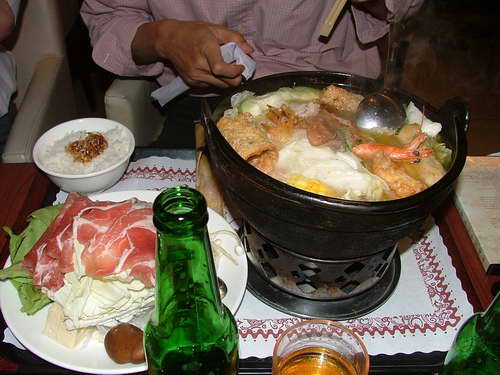 Hotpot and beer: it doesn't get any better than this. |
One possible solution to the hostel problem is Mandarin Hostel. Instead of the usual set of moderately dingy rooms sharing an unmentionable bathroom, Mandarin Hostel offers small, fully equipped apartments for short-term stays around the city of Taipei. I have not tried them yet, so if any readers do, let me know the results. |
| Unless you come competent in Chinese, you will be unable to find a place on your own, so riffle through your acquaintance networks until you find someone who has/knows of a place to rent. Some message boards, like Forumosa, have ads for housing. |
| One of the best places to find housing is where foreigners congregate. Places like the Mandarin Training Center in Taipei, or Bagel Bagel in Kaohsiung, are good spots. Another good place to look is the bulletin board at the local American or missionary schools. Some schools either offer housing, or offer to help you find it. |
| Foreigners often live with roommates until they know enough to strike out on their own. Rentals are plentiful, in a wide variety of price ranges, in many neighborhoods and in all shapes and sizes. Apartments are cheaper than houses of course, and more common. Contracts are standard practice (standard contracts are sold at 7-11). My understanding is that the English wording is not enforceable in law, so unless it's in Chinese, promises by landlords don't count (not that they count anyway...........). | |
|
|
|
| A typical Taipei alley.
This one,
off Fuhsing N. Rd. in Taipei, shows a number of the features that
render
Taiwanese cities so unlivable: high population densities, a lack of
sidewalks
and parking, different types of vehicles using the same space,
government
indifference to private use of public space (note how the sign juts
into
the road), the dearth of light and moving air, and constant decay and
repair
of streets. By the same token, they highlight the convenience,
due
to the high population density, of having many different kinds of
business
services available in a single neighborhood. Most neighborhoods in
Taipei,
Kaohsiung and other cities are similarly crammed. Residents fight
back against the inhuman conditions by raising plants and caring for
each
other in neighborly ways.
By custom, the space in front of a shop or house belongs to that shop. That custom will be enforced by violence if necessary, by anyone concerned. Once a friend parked his car in front of what we thought was a deserted building. No sooner had we killed the engine than out of the building ran a little girl of nine or ten. To our amusement and despite our shouts, she immediately began kicking in the side of my friend's car. |
|
|
|
|
| For most singles, the incredible low quality of the housing won't be an issue. Not until one is married with kids does one really begin to notice how bad the housing situation in Taiwan truly is. |
| Renting a house on your own is not difficult. You
can check
the classifieds, but those rents are higher.
|
|
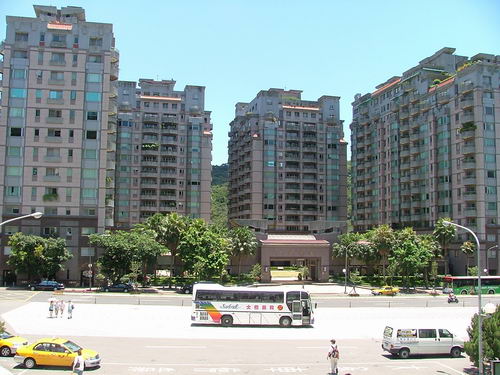 Upscale apartments across from the National Palace Museum. |
Realtors also maintain lists
of rentals, but sometimes they
demand a
fee. |
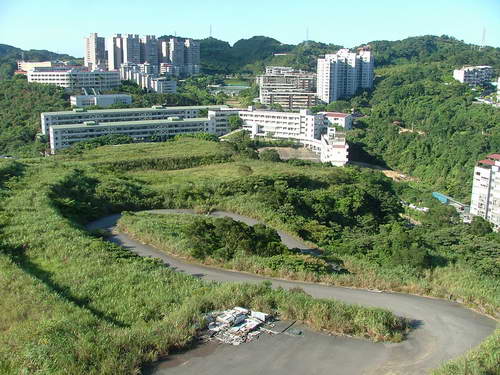 Apartments and a school in the hills outside of Keelung. |
There are several other ways to find rentals. The very best, #1 way is to drive around until you find a neighborhood which appeals in the area you like, then.... |
| ...look for the red and yellow signs advertise rentals and sales. Typically these are posted on telephone poles, walls, abandoned cars, etc. However, houses for sale may also be available for rent. It never hurts to call and ask. |
| Number 1 method: The best rentals are never advertised. I don't know why; I suppose Taiwanese landlords expect renters to have telepathy. |
| First, drive around until you find a neighborhood you like. Then find empty houses in the neighborhood and ask next-door neighbors (bring a local for this one). We've located good houses this way. |
| Remember, every neighborhood has empty houses. Many people have given up trying to find renters -- something like a third to a half of all houses in Taichung are empty -- so your appearance is a great opportunity for them. |
|
|
|
|
| In general, northern Taiwan is more expensive and
crowded
than southern Taiwan. A two-bedroom fourth-floor flat in Taipei rents
for
$10 - 12,000 a month, a five-bedroom house outside of Kaohsiung (with a
garden in front and a play area in back) goes for $10,000. However, you
can probably find a house in your range anywhere, if you ask around. |
| Opportunities for other kinds of work are greater
in the
north (but teaching pay is higher in the south), and the cities of
Taipei
and Hsinchu are more cosmopolitan. The south, especially outside of
Kaohsiung,
is one of the most dirty, polluted, ill-run places on the planet. In
the
south and outside the cities, the use of both Mandarin and English
disappears
rapidly. Further, while theft and vandalism are serious problems in
Taipei,
they are simply obnoxious down south.
However, down south the roads are bigger. Things are cheaper, too. |
| The East Coast remains clean and beautiful. If you are into the outdoors, you might consider relocating to Taitung, Hualien or I-lan. Good luck finding a job, though. |
| Another factor to consider in choice of cities is that the foreign population in Taipei is more diverse and interesting. Taichung is the center of missionary activity. Many long-term expats have relocated to Taichung due to its excellent weather. Tainan has a great historic atmosphere. Kaohsiung has little for foreigners besides English teaching. |
| Small towns, despite their bucolic appeal, are not only dull but rife with crime. Many are run by local officials working with organized crime gangs. Here's a page of pictures and commentary a one representative small town in southern Taiwan. |
| Taipei
Taipei is cleaner, safer, more convenient and better-run than Taiwan's other cities (the government's tender care of Taipei is bitterly lampooned in the southern parody of KMT sloganeering: "stress the North, ignore the South").
|
| Iin Taipei, don't live in the city, or in the suburbs southwest of the city like Panchiao and San Chung, where there are high concentrations of industry. The pollution, traffic, and noise in those areas are debilitating. |
| Live in the suburbs southeast or north of the city. Yung Ho, Mucha, or Neihu are good places to live. Tienmu, the foreign ghetto, is expensive and everyone speaks English. Additionally, it can be a pain to get into Taipei, since there is only one route into the downtown. | be shops, with families occupying the second, third and fourth floors. |
| You might also want to think about Tamshui, which is now served by an excellent metro system, as a possible alternative to Taipei. Fifteen minutes on the metro will bring you into Taipei, yet you could live in a more livable small-feeling town on the ocean. |
| Taipei has several downsides. First, it is extremely expensive. The cost of living is 50-100% higher than elsewhere in Taiwan. In central Taiwan we rent a five-bedroom house with a large grassy yard next to a scenic area for NT$10,000 a month. In Taipei that will get you a two-bedroom flat on the 4th floor of a nondescript apartment building. |
| Since there are plenty of foreign restaurants and other opportunities to spend money you don't have on things you don't need, it is more difficult to save money. | 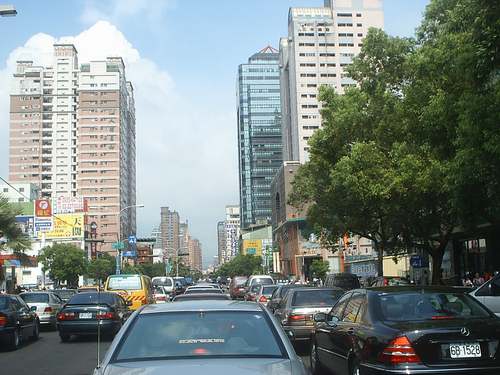 Apartment
blocks and office towers tower over a traffic jam in Taichung.
Apartment
blocks and office towers tower over a traffic jam in Taichung. |
| Another of Taipei's drawbacks is the horrible weather. Taiwanese houses are unheated, so if it is 6C outside, it is only a little warmer inside. Taipei is much colder than its latitude would suggest. Not only are the winters cold, but it can rain for weeks on end, each day 24 hours of absolute misery. In the summer the city becomes a giant open-air sauna, where even the buildings seem to sag from the sultry weather. |
| In addition to the miserable weather, one other strong reason not to live in Taipei: the persistent water shortages that have lead to rationing each in the last few years. Government water policy is wildly screwed up, and no one is willing to make the hard choices, such as raising water rates, enforcing conservation, and restricting the population density in the Taipei Basin, that will ameliorate the situation. |
| Taichung
Known as "the California of Taiwan" for its superb weather, Taichung can be a great place to live. Months can pass without rain, just one gorgeous sunny day after another. |
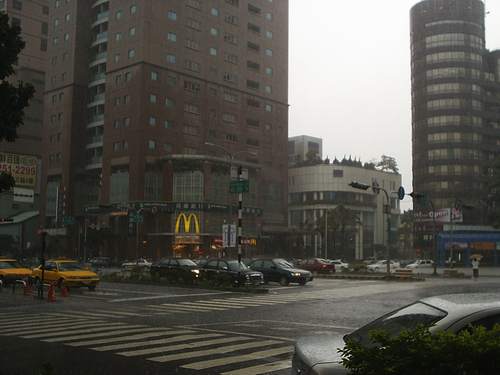 Taichung
downtown overrun with cars and rain.
Taichung
downtown overrun with cars and rain. |
| The missionary community is centered in Taichung, and Nike's Asian design center is also located there. Corning is putting in a massive new manufacturing facility just west of the city in Shalu. The city is the center of island's sporting goods industries, and also still a key player in the shoe industry. |
| Northern and western Taichung beat southern and eastern Taichung, although the eastern side of the city is less crowded. The area around Fengchia University is lively and interesting. Southern and southeastern Taichung, where the industrial suburbs of Dali and Wufeng are located, are very badly polluted. Avoid them like the plague. The area from Wufeng down to Nantou typically has some of the worst air on the island. |
| Taichung is a cultural desert compared to the north or even Kaohsiung, but because of its wide streets, and cheap housing, it can be a nice place to live. Except for the cramped old city center around the train station, there's always a place to park your car. Rents are cheap, and there are numerous empty houses. |
|
|
| Kaohsiung
Kaohsiung is one of the more unlivable places on the planet. on bad days the pollution burns the throat. The water is filled with heavy metals. There isn't much to do. |
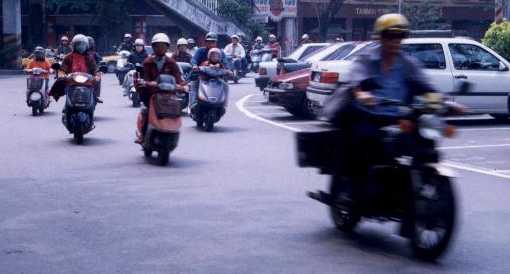 Motorcycles race through central Kaohsiung. The size,
lawlessness
and environmental effects of Taiwan's enormous scooter population
create
serious social problems. The government is currently financing the
development
of electric scooters. Motorcycles race through central Kaohsiung. The size,
lawlessness
and environmental effects of Taiwan's enormous scooter population
create
serious social problems. The government is currently financing the
development
of electric scooters. |
| If you have to live in Kaohsiung, the nicest housing is out by Chengching Lake, although some individual neighborhoods are nice. | 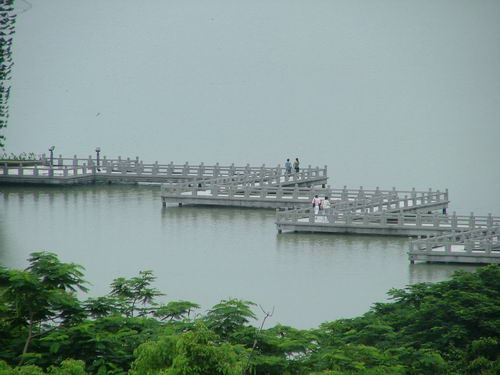 Chenching
lake, outside of Kaohsiung city. Chenching
lake, outside of Kaohsiung city. |
| Kaohsiung's major
advantages are
the hot weather, and its prime location just three hours from the
clean,
beautiful East Coast. There are some interesting restaurants down by
the
docks, and not much else.
|
|
| One exception is the Love
River, which has become an important tourist spot in the city. The
large science and technology museum is also worth a visit. |
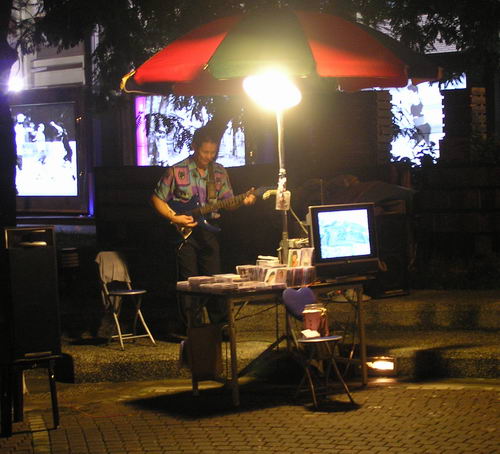 A street performer on the Love River walk at night. |
| Dengue fever has re-appeared in Kaohsiung, and in neighboring Pingtung. It will only get worse. | 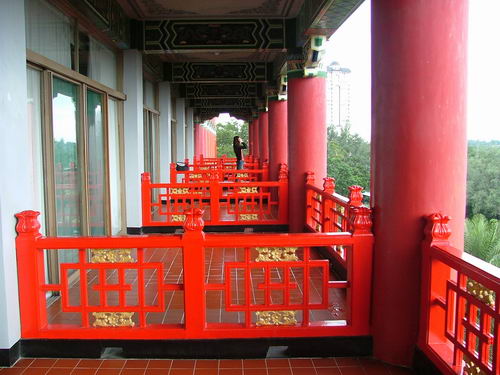 Waking up at the Yuanshan Hotel in Kaohsiung. |
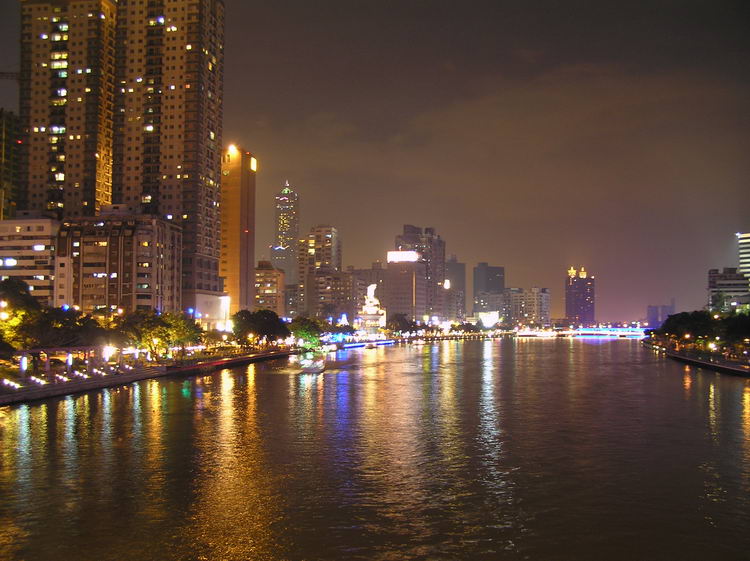 The Love River in Kaohsiung at night. |
|
| Keelung
Keelung, located on the northeast tip of Taiwan, is one of the rainest places in the world. Despite the rain and often cold winter temperatures, spectacular views from the slopes above the city and great seafood have given this declining port a unique, cozy, livable feel. |
| The island's best Starbucks is located right next to the harbor. Unfortunately the local government has failed to realize the fantastic potential of this little gem of a city. | |
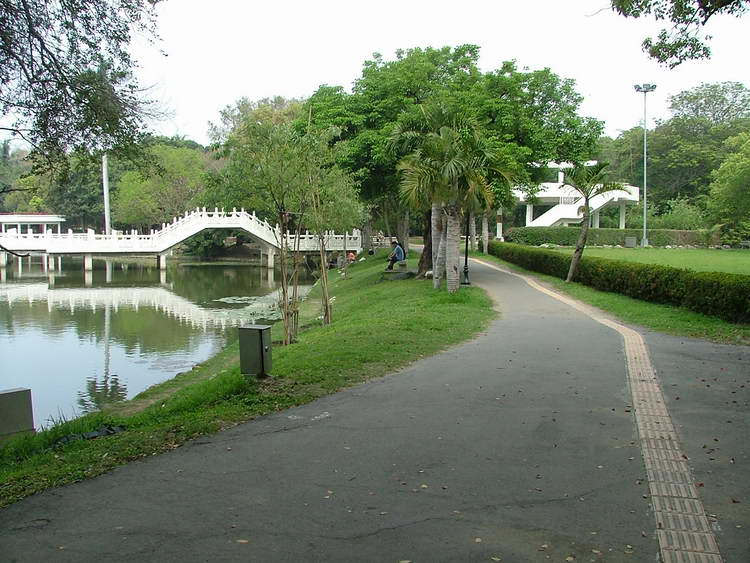 A park in Tainan. |
|
| Tainan Long the island's capital and now a center of Taiwanese nationalism, Tainan can be a great place to live. |
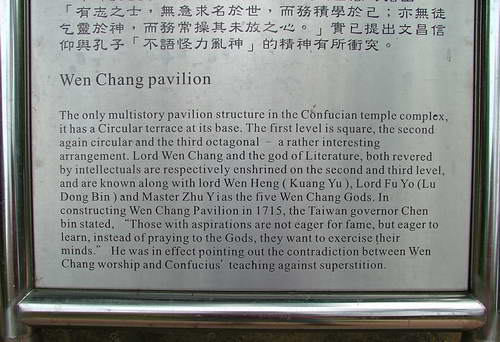 English introduction at a Tainan historical site. |
| The
city is studded with historical relics, including scores of famous
temples. Several forts testify to the city's role as the administrative
center of colonial empires. It is also famous among the locals for its
cuisine. |
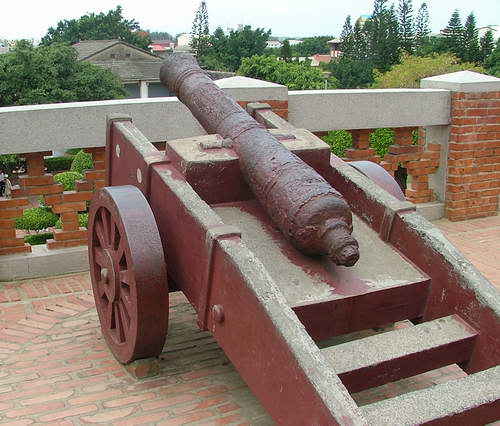 A once mighty-cannon guards a Tainan fort. |
|
|
|
|
| Don't rent by, over, or across from a neighborhood temple. They have celebrations that go far into the night, sometimes 2 or 3 am. It's not quaint and cultural to be awakened at 3:00 a.m. by fireworks ignited to scare off ghosts or by idiots banging drums in the same rhythm for hours on end, like Orcs assaulting Minas Tirith. Temple celebrations also block traffic, make smoke and attract riff-raff to the neighborhood. |
| Be sure to rent a house
in which
all the windows and other access are barred. Break-ins
are endemic. Be sure to get a place with bars over the windows and
balcony.
Check with the neighbors before you rent. |
| It's a good idea to make sure the bars have an exit hatch so that you can get out in case of fire. Every year scores of people die because they can't escape from fires due to barred windows. |
| Lock those mailboxes!
Pilferage will occur.
Careful with that garbage! Your neighbors may rifle through your garbage looking for recyclables, or for credit card receipts, or out of curiousity. Burn everything personal. Every place has its own garbage system. In some neighborhoods boxes are set out in the evening for you to place your garbage, but in most neighborhoods in the cities the garbage truck drives by around a fixed time and you have to run out, catch up to it, and toss your trash in. It will sound its way with pleasant music, just like an ice cream truck in the States. Garbage is collected 6-7 days in most areas. |
| Don't seal up house in
winter
for heating. Concrete houses do not
exchange
air with the outside. A concrete house with the leaky doors and windows
properly sealed is a deathtrap. Every winter entire
families suffocate to death in Taipei because they run a gas water
or room heater in a sealed house (more than 70 deaths in the winter of
2004-5) (and
in Taichung too). Don't become a victim.
Make sure that your gas water heater is outside the house, not inside it.
|
| Additionally, your heater can kill you by fire as well. Be careful with it. |
| Don't rent or live next to a military base. They are hothouses of petty crime. |
| In the summer you will need at least a fan (but
some summers
will be unbearable without aircon), in the winter in the north, a
heater.
|
|
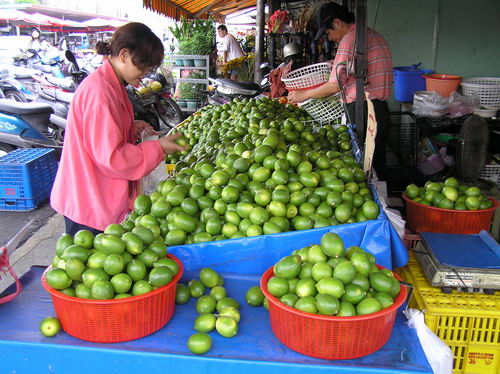 Picking lemons in a morning market. The ubiquity of such markets helps make the cities livable. |
Mosquitoes are most active in
the evening and early morning,
so close
your screen doors before 10:00 and after 5:00. |
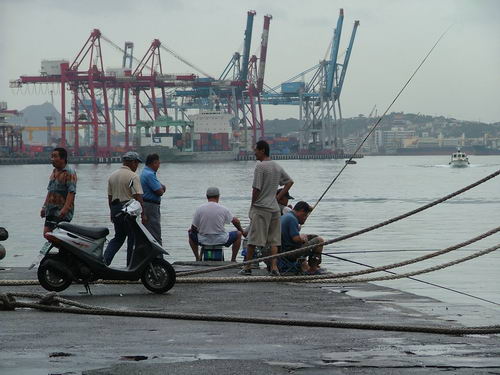 Fisherman in Keelung. |
My mother-in-law advises that mosquitoes will lay their eggs in the drainpipes that lead away from bathroom floors, filling your house with clouds of mosquitoes whose origin will baffle you. Eliminate these by dumping boiling water or insecticides down the pipes from time to time. |
| Your stove will run on gas, not electricity.
You'll need
to order gas every five or six weeks or so for it. The local gas
company
will sell you gas for about $500-$600 a cylinder, and deliver it right
to your door. Just call the number written on the canister.
If you don't want the hassle of using gas, electric hot plates, warmers, ovens, and cookers are available everywhere. |
| You might want to think
about avoiding
apartments in buildings of 12 stories or less.
Buildings of 13 floors and above are strictly regulated for earthquake
safety by take-no-nonsense inspectors. The 12 and under crowd is
indifferently
regulated and will not be safe. |
|
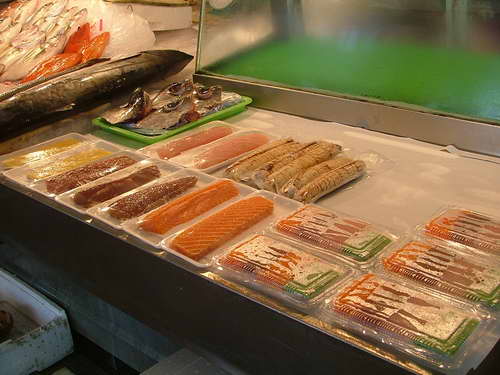 Sashimi displayed in a local fish market. |
Be sure that your house has a
fan above the stove. Lung
cancer, caused in large part by cooking smoke, is now the leading
killer of females in Taiwan. |
A full range of curios, knick-knacks, and gewgaws may be found in the local markets. |
Cable TV is everywhere in the cities so you can watch American sports, especially baseball and basketball, both of which are popular in Taiwan, as well as a variety of movie channels, most of them bad. Cable is one of the great things about Taiwan -- you can get a year of cable for US$40-100, with HBO, Cinemax, and several other movie channels, whereas that's we were paying for a month of basic cable in the USA. |
| If you live in a small town on the west coast plain (why?) try to avoid houses next to rice fields, factories or large stretches of undeveloped, grassy or bushy plots. Rice fields are burnt off at intervals, while grassy plots and factories are frequent sites of trash burning. |
| Once you have a house, you can fill it with stuff by buying things from people who are leaving. The local English schools and restaurants will have plenty of advertisements from people moving on and selling stuff cheap. Missionary organizations are also good places to locate stuff, since missionaries are constantly rotating out to new assignments. |
| DIY types will be cheered to know that B&Q
and numerous
local DIY places are found everywhere.
Each neighborhood also has one or more handymen who will install things like lights and water heaters quickly and cheaply. |
| If you move, do not tell your neighbors unless absolutely necessary. You should basically get in the habit of not being open about your personal life the way Americans are with each other. |
| Hiring a moving company is a chancy process. Most are run by organized crime thugs. Things often "fall off the truck" or the company will stop right in the middle of the road and demand more money, or they will unload your stuff right there on the spot. Or they may be casing out your house for a possible robbery. It's best to riffle through your acquaintance networks to locate a reliable firm, or find a friend with a truck. |
|
|
|
|